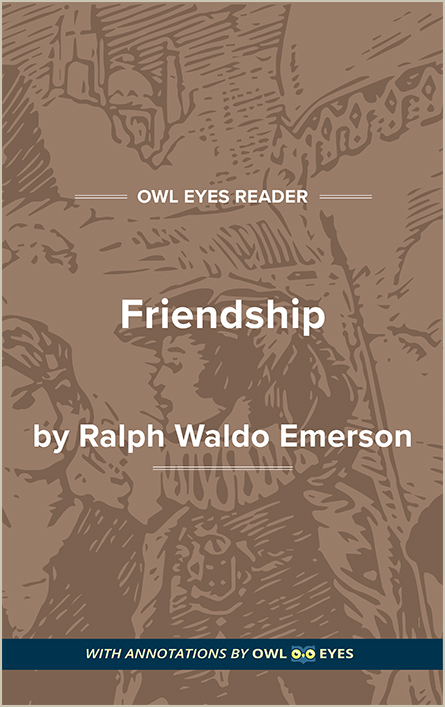Analysis Pages
Themes in Friendship
Developing Strong Friendships: Before someone can enter into a friendship, Emerson claims that she must first look inward and develop her own sense of self. Once she has grasped a sense of autonomy, then can she look to others for companionship. In Emerson’s perspective, friendship must take root and bloom slowly and naturally, a process he refers to with the German word naturlangsamkeit. If a friendship is blindly or rashly formed, it will not develop with the same integrity; instead it should develop slowly and patiently—like a diamond taking shape in nature.
The Paradoxical Nature of Friendship: Echoing Aristotle’s “O my friends, there is no friend,” Emerson plays off of the dichotomies of a friendship. He sees a natural paradox in friendship, in the way that two people are continually oscillating between stages of estrangement and attachment. Using oxymoronic language, Emerson demonstrates how friendship involves an “alliance of formidable natures.” The two individuals involved in a friendship must each form a strong bond; however they must also retain their own individualism and look to one another from a distance, so the lustre of friendship might not fade.
Friendship as a Celestial Bond: When two individuals in a friendship connect as two spirits, their relationship transcends all earthly ties. Love and friendship, according to Emerson, is as holy as the divinity he envisions in nature. In the final lines of his essay, he states that true friendship is when one friend “deifies” the other, meaning that one individual looks onto the other with the reverence and veneration as a human looking to a spiritual being. This idea suggests the sacred bond between friends.
Themes Examples in Friendship:
"Friendship"
🔒"It treats its object as a god, that it may deify both...." See in text ("Friendship")
"empyrean..." See in text ("Friendship")
"Janus-faced..." See in text ("Friendship")
"We will meet as though we met not, and part as though we parted not...." See in text ("Friendship")
"Janus-faced..." See in text ("Friendship")
"Ought I to feel that our tie is profane in comparison with yonder bar of cloud that sleeps on the horizon, or that clump of waving grass that divides the brook?..." See in text ("Friendship")
"magnanimous..." See in text ("Friendship")
"Let it be an alliance of two large, formidable natures..." See in text ("Friendship")
"Better be a nettle in the side of your friend than his echo...." See in text ("Friendship")
"The only joy I have in his being mine, is that the not mine is mine. ..." See in text ("Friendship")
"drudgery..." See in text ("Friendship")
"A friend therefore is a sort of paradox in nature...." See in text ("Friendship")
"One is truth...." See in text ("Friendship")
"Thine ever, or never...." See in text ("Friendship")
"I chide society, I embrace solitude..." See in text ("Friendship")
"But as soon as the stranger begins to intrude his partialities, his definitions, his defects, into the conversation, it is all over...." See in text ("Friendship")
"uneasiness betwixt pleasure and pain invades all the hearts of a household...." See in text ("Friendship")
"The scholar sits down to write, and all his years of meditation do not furnish him with one good thought or happy expression; but it is necessary to write a letter to a friend,..." See in text ("Friendship")

